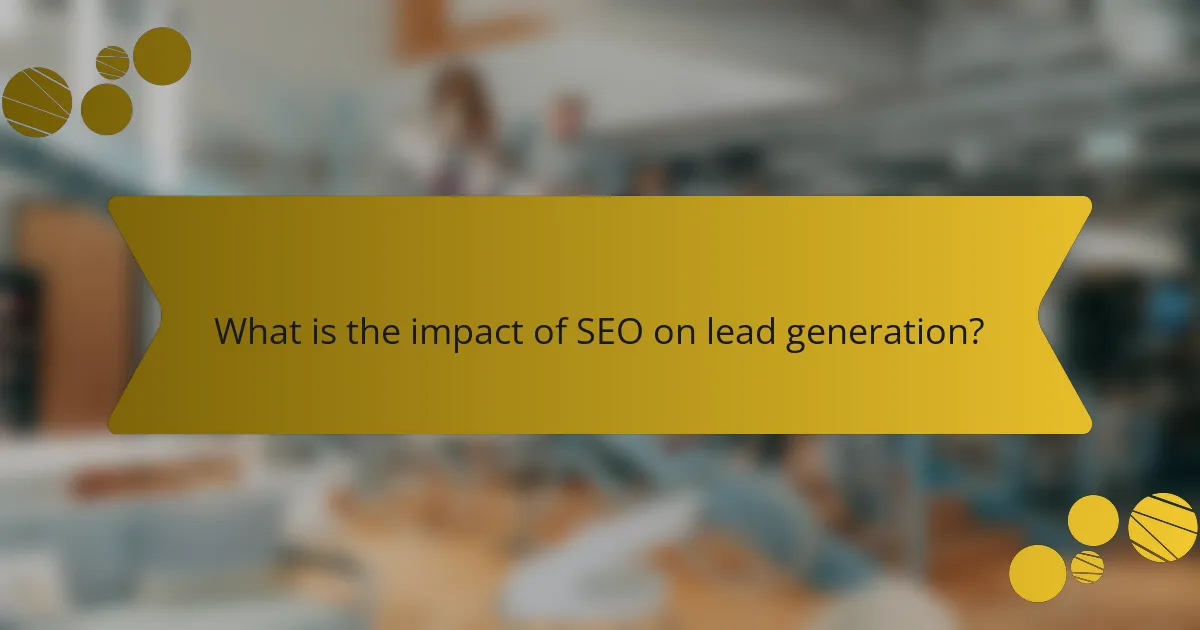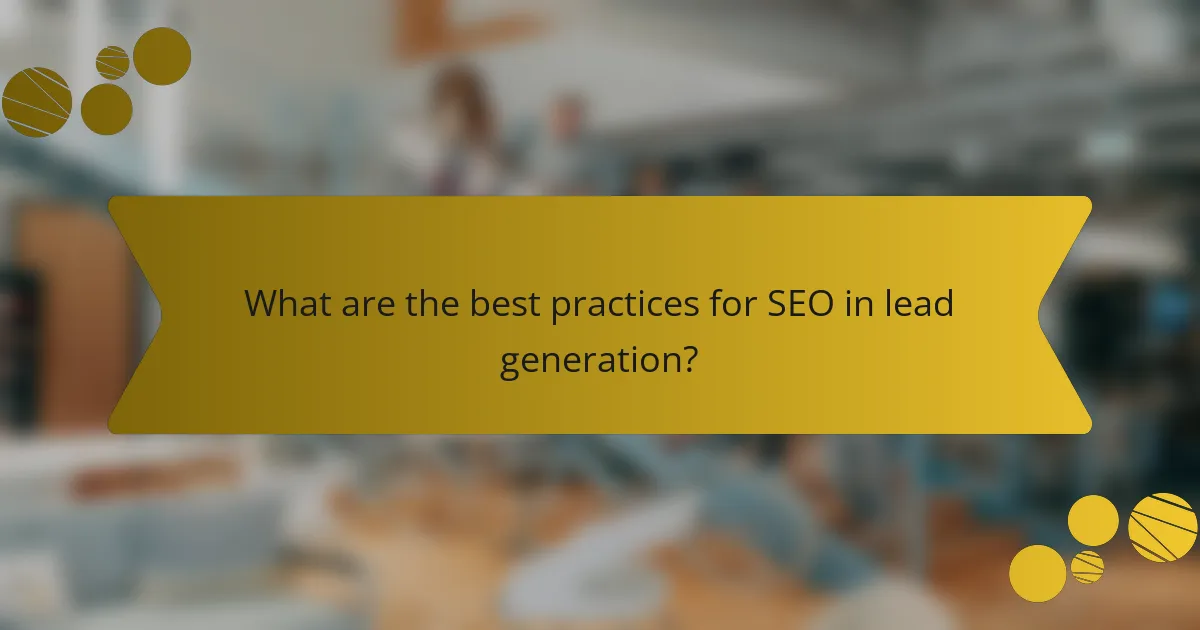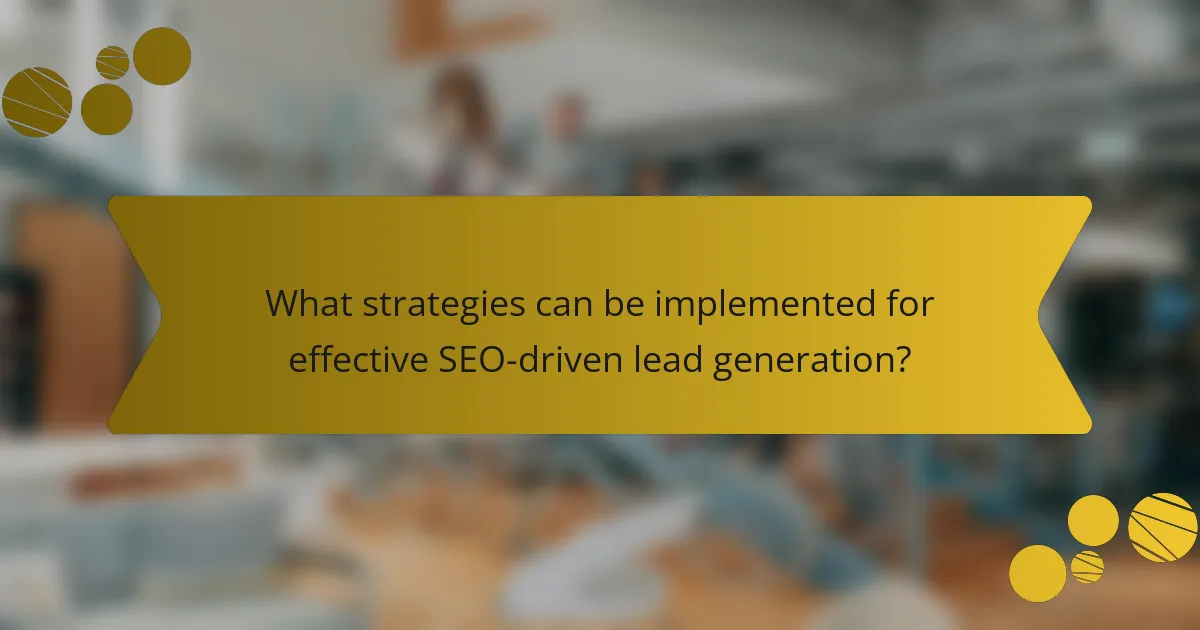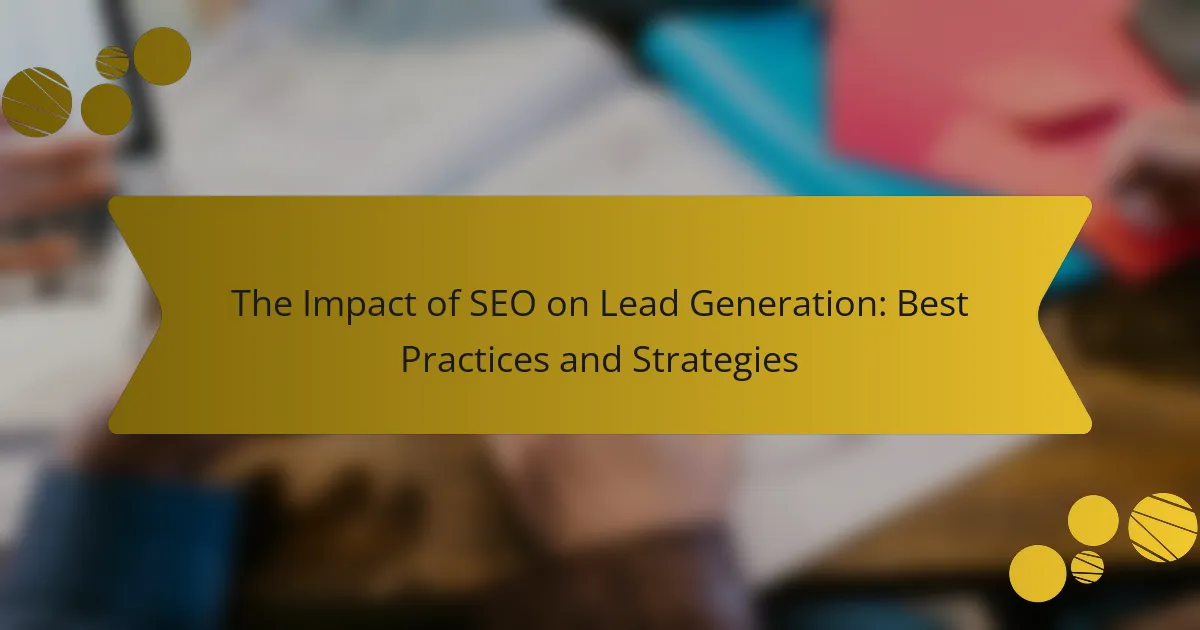SEO, or Search Engine Optimization, plays a crucial role in enhancing lead generation by increasing a website’s visibility in search engine results. Improved rankings lead to higher organic traffic, which consists of potential customers actively seeking relevant products or services. This article explores effective SEO strategies that attract targeted leads, including optimizing website content for relevant keywords, implementing on-page SEO techniques, building backlinks, and utilizing local SEO approaches. Additionally, it highlights the importance of creating high-quality content and regularly updating it to maintain relevance and improve conversion rates. By understanding these best practices, businesses can refine their SEO efforts to drive qualified traffic and enhance lead generation outcomes.

What is the impact of SEO on lead generation?
SEO significantly enhances lead generation by improving a website’s visibility in search engine results. A higher ranking leads to increased organic traffic. This traffic includes potential customers actively searching for relevant products or services. According to HubSpot, 61% of marketers say improving SEO and growing their organic presence is their top inbound marketing priority. Effective SEO strategies attract targeted leads, as they align content with user intent. Furthermore, optimized websites tend to have higher conversion rates. Research shows that companies with blogs generate 97% more links to their websites. This demonstrates that quality content, a key aspect of SEO, plays a crucial role in lead generation.
How does SEO influence the lead generation process?
SEO significantly influences the lead generation process by improving online visibility. Higher search engine rankings lead to increased organic traffic. This traffic often consists of users actively searching for relevant products or services. Consequently, businesses can attract more qualified leads. According to a HubSpot report, 61% of marketers say improving SEO and growing their organic presence is their top priority. Effective SEO strategies enhance user experience and engagement, which can lead to higher conversion rates. Optimizing content with targeted keywords also aligns with user intent, making it easier for potential customers to find solutions. Ultimately, SEO serves as a foundational element in generating leads through enhanced online presence and engagement.
What are the key elements of SEO that affect lead generation?
The key elements of SEO that affect lead generation include keyword research, on-page optimization, technical SEO, content quality, and link building. Keyword research identifies terms potential leads use to search for products or services. On-page optimization ensures that these keywords are effectively integrated into website content, titles, and meta descriptions. Technical SEO involves improving site speed, mobile-friendliness, and crawlability, which enhances user experience and search engine rankings. High-quality content attracts and engages visitors, increasing the likelihood of conversions. Link building enhances authority and visibility, driving more traffic to the site. Together, these elements create a robust SEO strategy that significantly boosts lead generation.
How do search engine rankings relate to lead generation success?
Higher search engine rankings lead to increased visibility and traffic. Increased visibility attracts more potential leads to a website. Studies show that the top three search results receive over 60% of clicks. This means that businesses ranking higher are more likely to generate leads. Additionally, higher rankings build credibility and trust with users. Trust leads to higher conversion rates from visitors to leads. A report by HubSpot indicates that 61% of marketers consider improving SEO a top priority for lead generation. Thus, effective SEO strategies directly enhance lead generation success.
Why is lead generation important for businesses?
Lead generation is crucial for businesses because it directly impacts revenue growth. It helps identify potential customers who have shown interest in products or services. By capturing leads, businesses can nurture relationships and guide prospects through the sales funnel. Effective lead generation strategies can increase conversion rates and boost sales performance. According to HubSpot, companies that excel at lead generation see 50% more sales-ready leads at a 33% lower cost. This demonstrates the financial benefits of investing in lead generation efforts.
What are the main objectives of lead generation?
The main objectives of lead generation are to identify potential customers and convert them into leads. This process helps businesses build a database of interested prospects. Effective lead generation increases sales opportunities. It also enhances brand awareness in the target market. According to HubSpot, companies that prioritize lead generation see a 50% increase in sales-ready leads. Additionally, lead generation aims to nurture leads through the sales funnel. This involves engaging potential customers with relevant content. Ultimately, the goal is to drive conversions and increase revenue.
How does effective lead generation contribute to business growth?
Effective lead generation directly contributes to business growth by increasing the number of potential customers. It creates a steady flow of prospects interested in a company’s products or services. This process enhances sales opportunities, leading to higher revenue. According to HubSpot, companies with effective lead generation strategies see a 133% increase in qualified leads. Furthermore, effective lead generation improves conversion rates. Targeted leads are more likely to convert into paying customers. This targeted approach fosters better customer relationships and loyalty over time. Ultimately, effective lead generation builds a sustainable customer base, driving long-term growth.

What are the best practices for SEO in lead generation?
Best practices for SEO in lead generation include optimizing website content for relevant keywords. This ensures that potential leads can easily find your site through search engines. Additionally, creating high-quality, informative content attracts and engages visitors. Implementing on-page SEO techniques, such as optimizing title tags and meta descriptions, improves click-through rates. Building backlinks from reputable sites enhances domain authority. Utilizing local SEO strategies can capture leads in specific geographical areas. Regularly updating content keeps it fresh and relevant, which can improve rankings. Monitoring and analyzing SEO performance helps refine strategies for better lead generation outcomes.
How can keyword research enhance lead generation through SEO?
Keyword research enhances lead generation through SEO by identifying relevant search terms. These terms align with user intent and improve organic traffic. Targeting the right keywords increases visibility in search engine results. Higher visibility leads to more clicks and potential leads. According to a study by HubSpot, 61% of marketers prioritize SEO as their top inbound marketing strategy. Effective keyword research also helps in creating content that addresses user needs. This targeted content can convert visitors into leads. By optimizing for specific keywords, businesses can attract qualified traffic. Ultimately, this process drives growth and increases conversion rates.
What tools are available for effective keyword research?
Effective keyword research tools include Google Keyword Planner, Ahrefs, SEMrush, and Moz. Google Keyword Planner provides insights into search volume and competition. Ahrefs offers keyword difficulty scores and related keywords. SEMrush features a comprehensive keyword database and competitive analysis tools. Moz provides keyword suggestions and SERP analysis. These tools are widely used for optimizing content and improving SEO strategies.
How do long-tail keywords improve lead quality?
Long-tail keywords improve lead quality by attracting more targeted traffic. These keywords are specific phrases that potential customers use when searching for a product or service. By focusing on long-tail keywords, businesses can reach users who are further along in the buying process. Research shows that long-tail keywords account for 70% of all search queries. This specificity often leads to higher conversion rates. For instance, users searching for “best organic dog food for allergies” are likely more interested in making a purchase than those searching for “dog food.” Therefore, targeting long-tail keywords can significantly enhance lead quality and conversion potential.
What role does content marketing play in SEO and lead generation?
Content marketing is essential for both SEO and lead generation. It enhances search engine visibility through optimized content. High-quality content attracts backlinks, which improve domain authority. This leads to higher rankings on search engine results pages (SERPs). Additionally, content marketing engages potential customers. It nurtures leads by providing valuable information. According to HubSpot, businesses that prioritize blogging generate 67% more leads than those that do not. This demonstrates the direct correlation between content marketing and lead generation. Overall, effective content marketing is a key strategy in driving SEO success and increasing leads.
How can high-quality content attract more leads?
High-quality content attracts more leads by providing valuable information that resonates with the target audience. It establishes authority and trust, making potential customers more likely to engage. According to a HubSpot report, companies that prioritize blogging are 13 times more likely to see a positive ROI. Engaging content encourages sharing, increasing visibility across social media platforms. Additionally, optimized content improves search engine rankings, making it easier for leads to find the business. High-quality content also addresses specific pain points, leading to higher conversion rates. This approach ultimately nurtures leads through the sales funnel, increasing the likelihood of conversion.
What types of content are most effective for lead generation?
Educational content, such as blog posts and how-to guides, is highly effective for lead generation. This type of content provides valuable information that addresses potential customers’ pain points. Case studies also serve as powerful tools, showcasing real-life examples of success. Webinars can engage audiences while demonstrating expertise in a particular field. E-books and whitepapers offer in-depth insights, often requiring users to provide contact information for access. Infographics simplify complex information and are highly shareable, increasing visibility. According to HubSpot, companies that prioritize blogging are 13 times more likely to see a positive ROI. Hence, diverse content types can significantly enhance lead generation efforts.

What strategies can be implemented for effective SEO-driven lead generation?
Effective SEO-driven lead generation strategies include optimizing website content, improving site speed, and utilizing keyword research. Optimizing website content involves creating valuable, relevant content that addresses user queries. This attracts organic traffic and enhances user engagement. Improving site speed is crucial, as studies show that a one-second delay can reduce conversions by 7%. Utilizing keyword research helps identify terms potential customers use, ensuring content aligns with search intent.
Additionally, implementing on-page SEO techniques, such as meta tags and header optimization, can improve visibility. Building high-quality backlinks enhances domain authority, further boosting search rankings. Finally, leveraging local SEO strategies can attract nearby customers, increasing lead generation. These strategies collectively enhance online presence and drive qualified traffic to the website.
How can on-page SEO techniques boost lead generation?
On-page SEO techniques can significantly boost lead generation by improving website visibility and user experience. Optimizing title tags and meta descriptions enhances click-through rates. Quality content that addresses user intent attracts more visitors. Properly structured URLs and internal linking facilitate easier navigation. Mobile optimization ensures accessibility for a broader audience. Fast loading times reduce bounce rates, keeping visitors engaged. According to a study by HubSpot, companies that prioritize SEO are 13 times more likely to see a positive ROI. These techniques collectively drive more targeted traffic, increasing the chances of converting visitors into leads.
What are the essential on-page SEO elements to focus on?
The essential on-page SEO elements to focus on include title tags, meta descriptions, headers, and content quality. Title tags should accurately reflect the page content and include relevant keywords. Meta descriptions provide a summary of the page and should also contain keywords to improve click-through rates. Headers (H1, H2, H3) structure content and enhance readability, aiding both users and search engines. Content quality is crucial, as search engines prioritize informative and engaging material. Moreover, keyword optimization within the content and alt tags for images further enhance on-page SEO. These elements collectively improve search visibility and user experience, leading to better lead generation outcomes.
How does user experience affect lead conversion rates?
User experience significantly impacts lead conversion rates. A positive user experience leads to higher engagement and trust. Studies show that 88% of online consumers are less likely to return to a site after a bad experience. Improved navigation and fast loading times enhance user satisfaction. Websites with intuitive design can increase conversion rates by up to 200%. Additionally, clear calls to action guide users effectively. Optimizing user experience can reduce bounce rates and increase time spent on site. These factors collectively drive higher lead conversions.
What off-page SEO strategies are beneficial for lead generation?
Off-page SEO strategies that are beneficial for lead generation include link building, social media engagement, and influencer marketing. Link building enhances website authority and improves search engine rankings. Higher rankings lead to increased visibility, driving more traffic and potential leads. Social media engagement fosters relationships and brand awareness. Sharing valuable content on social platforms can attract new audiences. Influencer marketing leverages established trust and credibility. Collaborating with influencers can introduce products to wider audiences, generating quality leads. Studies show that businesses with a strong off-page strategy see a significant increase in lead generation.
How can backlinks influence lead generation efforts?
Backlinks can significantly enhance lead generation efforts by improving website authority and visibility. Search engines use backlinks as a major ranking factor. Higher rankings lead to increased organic traffic. More traffic results in more potential leads. According to a study by Moz, pages with higher authority receive more clicks. Additionally, backlinks from reputable sites can build trust with visitors. Trust can lead to higher conversion rates. Thus, effective backlink strategies can directly influence lead generation outcomes.
What role do social media platforms play in SEO and lead generation?
Social media platforms significantly enhance SEO and lead generation. They increase brand visibility and drive traffic to websites. Search engines consider social signals as indicators of credibility. High engagement on social media can lead to improved search rankings. Additionally, social media platforms facilitate the sharing of content. This sharing can generate backlinks, which are crucial for SEO. According to a study by HubSpot, 64% of marketers actively use social media for lead generation. Furthermore, social media ads can target specific audiences effectively. This targeted approach can result in higher conversion rates.
What common mistakes should be avoided in SEO for lead generation?
Common mistakes to avoid in SEO for lead generation include neglecting keyword research. Effective keyword research identifies terms potential leads use. Failing to optimize for these keywords leads to missed opportunities. Another mistake is ignoring on-page SEO elements. Title tags, meta descriptions, and headers should be optimized for target keywords. Poor site structure can also hinder lead generation. A clear, logical structure improves user experience and search engine crawling.
Additionally, not focusing on mobile optimization is a critical error. With over half of web traffic from mobile devices, a mobile-friendly site is essential. Slow loading times can deter potential leads. According to Google, a one-second delay can reduce conversions by 20%. Lastly, neglecting content quality can hurt lead generation. High-quality, relevant content attracts and retains visitors, increasing conversion chances.
How can poor SEO practices hinder lead generation?
Poor SEO practices can significantly hinder lead generation. Ineffective keyword targeting can result in low visibility on search engines. When potential customers cannot find a website, they cannot convert into leads. Slow website loading times can lead to high bounce rates. Users are likely to leave a site that takes too long to load. Poorly optimized content fails to engage visitors, reducing the chances of conversions. Lack of mobile optimization can alienate a large segment of users. According to Google, over 50% of searches occur on mobile devices. If a site is not mobile-friendly, it risks losing these potential leads. Lastly, neglecting local SEO can limit visibility in local search results. This can be detrimental for businesses that rely on local clientele.
What are the signs of ineffective SEO strategies?
Ineffective SEO strategies can be identified through several key signs. A significant drop in organic traffic indicates poor performance. Low search engine rankings for targeted keywords suggest ineffective optimization. Minimal engagement metrics, such as high bounce rates, reflect lack of user interest. Limited or no conversions show that the strategies are not attracting potential leads. Inconsistent content updates can signal neglect in maintaining SEO efforts. Poorly optimized website structure can hinder search engine crawlers, affecting visibility. Lastly, lack of backlinks from reputable sites indicates weak authority in the niche. These signs collectively point to ineffective SEO strategies that require reevaluation and adjustment.
What are the key takeaways for optimizing SEO for lead generation?
Key takeaways for optimizing SEO for lead generation include focusing on keyword research, on-page optimization, and quality content creation. Keyword research identifies terms potential customers use. Using these keywords strategically in titles, headers, and content improves visibility. On-page optimization includes optimizing meta tags, URLs, and images. This enhances user experience and search engine rankings. Creating quality content addresses audience needs and establishes authority. According to HubSpot, businesses that prioritize blogging are 13 times more likely to see a positive ROI. Building backlinks from reputable sites also boosts authority. Lastly, optimizing for mobile and page speed is crucial, as Google prioritizes mobile-friendly sites.
What actionable tips can improve SEO outcomes for lead generation?
Optimize website content for relevant keywords. This enhances visibility in search engine results. Conduct keyword research to identify high-traffic terms related to your business. Utilize these keywords in titles, headers, and throughout the content.
Improve website loading speed. Google considers page speed a ranking factor. Faster websites provide better user experiences, leading to higher conversion rates. Aim for a loading time under three seconds.
Ensure mobile-friendliness of your website. A responsive design improves accessibility on various devices. Over 50% of web traffic comes from mobile users, making this crucial for lead generation.
Create high-quality, engaging content. Valuable content encourages visitors to stay longer. This reduces bounce rates and signals to search engines that your site is worth ranking.
Utilize local SEO strategies if applicable. Optimize your Google My Business listing to improve local visibility. Include local keywords to attract nearby customers.
Build backlinks from reputable sites. Quality backlinks enhance your site’s authority. Higher authority can lead to improved search rankings and more leads.
Monitor SEO performance using analytics tools. Regularly check metrics like organic traffic and conversion rates. This helps identify areas for improvement and refine your strategies.
How can businesses measure the effectiveness of their SEO strategies in lead generation?
Businesses can measure the effectiveness of their SEO strategies in lead generation through various metrics. Key performance indicators include organic traffic, conversion rates, and lead quality. Organic traffic indicates the number of visitors coming from search engines. Higher organic traffic often correlates with effective SEO practices. Conversion rates show the percentage of visitors who take desired actions, such as filling out a form. A higher conversion rate suggests that SEO strategies effectively attract relevant leads. Lead quality can be assessed through metrics like lead scoring and engagement levels. Tools like Google Analytics and CRM systems can provide insights into these metrics. Regularly tracking these indicators helps businesses refine their SEO strategies for better lead generation outcomes.
The primary entity of this article is SEO (Search Engine Optimization) and its impact on lead generation. The article outlines how effective SEO strategies enhance online visibility, attract qualified leads, and improve conversion rates through various techniques such as keyword research, on-page optimization, and content marketing. It emphasizes the importance of lead generation for business growth and provides actionable best practices for optimizing SEO to drive leads, including the significance of high-quality content and link-building strategies. Additionally, the article discusses common mistakes to avoid and metrics to measure the effectiveness of SEO efforts in generating leads.
